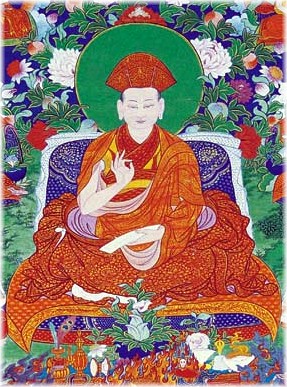Pema Karpo: Difference between revisions
Jump to navigation
Jump to search
No edit summary |
mNo edit summary |
||
| Line 1: | Line 1: | ||
[[Image:Pemakarpo.jpg|frame|'''Pema Karpo''']] | [[Image:Pemakarpo.jpg|frame|'''Pema Karpo''']] | ||
'''Künkhyen Pema Karpo''' ([[Wyl.]] ''pad ma dkar po'') aka '''Ngawang Norbu''' (''ngag dbang nor bu'') (1527-1592) was the fourth Gyalwang Drukpa. He was a great scholar and accomplished master of the [[Drukpa Kagyü]] school. Gene Smith writes, "The breadth of his scholarship and learning invites comparison with the [[Fifth Dalai Lama]]. It was [he] who systematized the teaching of the 'Brug pa sect." <ref>''Among Tibetan Texts'', p.82</ref> | '''Künkhyen Pema Karpo''' ([[Wyl.]] ''kun mkhyen pad ma dkar po'') aka '''Ngawang Norbu''' (''ngag dbang nor bu'') (1527-1592) was the fourth Gyalwang Drukpa. He was a great scholar and accomplished master of the [[Drukpa Kagyü]] school. Gene Smith writes, "The breadth of his scholarship and learning invites comparison with the [[Fifth Dalai Lama]]. It was [he] who systematized the teaching of the 'Brug pa sect." <ref>''Among Tibetan Texts'', p.82</ref> | ||
==Writings== | ==Writings== | ||
Revision as of 16:15, 24 February 2009

Künkhyen Pema Karpo (Wyl. kun mkhyen pad ma dkar po) aka Ngawang Norbu (ngag dbang nor bu) (1527-1592) was the fourth Gyalwang Drukpa. He was a great scholar and accomplished master of the Drukpa Kagyü school. Gene Smith writes, "The breadth of his scholarship and learning invites comparison with the Fifth Dalai Lama. It was [he] who systematized the teaching of the 'Brug pa sect." [1]
Writings
He composed 24 volumes of writings including a history of Buddhism and commentary on the Bodhicharyavatara.
Incarnations
There were two immediate incarnations of Künkhyen Pema Karpo: Paksam Wangpo who stayed in Tibet and Shabdrung Ngawang Namgyal (1594-1651) who went to Bhutan in 1616, where he introduced the Drukpa Kagyü teachings.
Notes
- ↑ Among Tibetan Texts, p.82
Further Reading
- E. Gene Smith, 'Padma dkar po and His History of Buddhism' in Among Tibetan Texts, Boston: Wisdom, 2001
- Michael Broido, 'Padma Dkar-po on Tantra as Ground, Path and Goal' in The Journal of the Tibet Society, Volume 4, 1984
- Michael Broido, 'Padma Dkar-po on Intergration as Ground, Path and Goal' in The Journal of the Tibet Society, Volume 5, 1985
- Michael Broido, 'Padma Dkar-po on the Two Sātyas' in Journal of the International Association of Buddhist Studies 8.2, 1985
- Padma Karpo Ngawang Norbu, The Practice of the Co-Emergent Mahamudra, translated by Ven. Anzan Hoshin sensei, Ottawa: Great Matter Publications, 1991